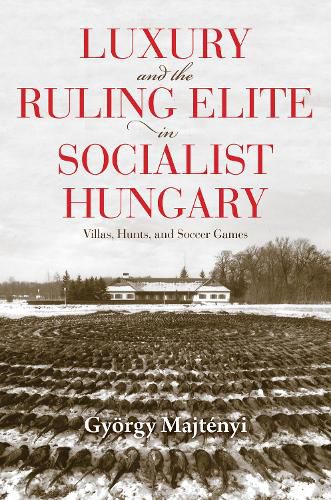Readings Newsletter
Become a Readings Member to make your shopping experience even easier.
Sign in or sign up for free!
You’re not far away from qualifying for FREE standard shipping within Australia
You’ve qualified for FREE standard shipping within Australia
The cart is loading…






After World War II, a new community of elite emerged in Hungary, in spite of the communist principles espoused by the government. In Luxury and the Ruling Elite in Socialist Hungary, Gyoergy Majtenyi allows us a peek inside their affluence.
Majtenyi exposes the lavish standard of living that the higher echelon enjoyed, complete with pools, Persian rugs, extravagant furniture, servants, and groundskeepers. They shopped in private stores stocked with expensive meats and tropical fruits just for them. They benefited from access to everything from books, telephone lines, and international travel to hunting grounds, soccer games, and even the choicest cemetery plots. But Majtenyi also reveals the underbelly of such society, particularly how these privileges were used as a way of maintaining power, initiating or denying entry to party members, and strengthening the very hierarchies that communism promised to abolish.
Taking readers on a fascinating and often surprising look inside the manor homes and vacation villas of wealthy post-World War II Hungarians, Majtenyi offers fresh insight into the realities of patriarchy, loyalty, gender, and class within the communist regime.
$9.00 standard shipping within Australia
FREE standard shipping within Australia for orders over $100.00
Express & International shipping calculated at checkout
After World War II, a new community of elite emerged in Hungary, in spite of the communist principles espoused by the government. In Luxury and the Ruling Elite in Socialist Hungary, Gyoergy Majtenyi allows us a peek inside their affluence.
Majtenyi exposes the lavish standard of living that the higher echelon enjoyed, complete with pools, Persian rugs, extravagant furniture, servants, and groundskeepers. They shopped in private stores stocked with expensive meats and tropical fruits just for them. They benefited from access to everything from books, telephone lines, and international travel to hunting grounds, soccer games, and even the choicest cemetery plots. But Majtenyi also reveals the underbelly of such society, particularly how these privileges were used as a way of maintaining power, initiating or denying entry to party members, and strengthening the very hierarchies that communism promised to abolish.
Taking readers on a fascinating and often surprising look inside the manor homes and vacation villas of wealthy post-World War II Hungarians, Majtenyi offers fresh insight into the realities of patriarchy, loyalty, gender, and class within the communist regime.